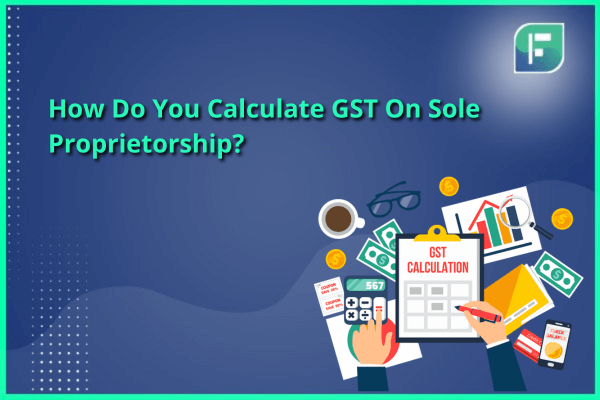A sole proprietorship registration denotes a business overseen by a person without the requirement for customary registration. It is available to anyone interested in initiating a project with minimal financial commitment. In this business format, the exclusive owner possesses complete authority, rendering it an appealing choice for individuals launching a modest venture from their residence or a designated site. The sole proprietor shoulders accountability for both setbacks and profits, supervising and guiding the business entirely. In this blog, we shall see the process on how to calculate GST on sole proprietorship.
Calculation of Income Tax for Sole Proprietorship
Various small kinds of business, like the supermarkets, boutiques, as well as other kind of retail stores, can operate as sole proprietorship firms. Even their are small manufacturers and traders can establish a sole proprietorship business. Under current income tax laws and in alignment with the slab rates applicable to the taxable income, a sole proprietorship is entitled to avail of tax deductions, similar to any other individual assessee. In contrast, registered businesses are subject to income taxes at fixed rates. To calculate GST on sole proprietorship, understanding the tax rates which are for the relevant year is essential.
Requirements for GST Registration in a Proprietorship Firm
GST registration becomes imperative for a proprietorship entity under stipulated circumstances. Before going into process to calculate GST on sole proprietorship, the conditions compelling GST registration encompass:
1. Annual Revenue Surmounts 40 Lakh Rupees:
To calculate GST on sole proprietorship, the need for GST registration is when the annual revenue of the proprietorship entity exceeding the threshold of 40 lakh rupees.
2. Inter-State Sales of Commodities or Services:
The obligation for GST registration arises when a proprietorship entity engages in the inter-state sale of commodities or services, traversing geographical boundaries.
3. Engaged in the Realm of eCommerce:
Proprietorship entity which is doing the eCommerce activities are compelled to partake in the process of GST registration.
4. Aiming for Input Tax Credit on Procurements:
GST registration becomes imperative for a proprietorship entity with aspirations to claim input tax credit on its procurements.
5. Voluntary Pursuit:
Proprietorship entities can also have responsibility for seek GST registration on a voluntary basis.
Documents Required for GST Registration in Proprietorship Firm
Within the process to calculate GST on sole proprietorship, for undergoing the registration process for a sole proprietorship under the Goods and Services Tax, the following is needed:
1. Copy of Personal Pan Card:
For GST registration, it’s essential to provide a copy of the proprietor’s Personal Pan Card.
2. Copy of Aadhar Card:
Submission of the proprietor’s Aadhar Card is a required document.
3. Business Location Proof:
Documents like an Electricity Bills, Telephone Bills, or Water Bills for the businesses location are necessary. If the office is rented, a Rent Agreement must be submitted.
4. Personal Bank Statement:
Submit the proprietor’s Personal Bank Statement, Cancelled Bank Cheque, or a front-page copy of the Passbook. If the firm has a current bank account, provide the current bank account statement instead of a savings account.
5. Passport Size Photographs:
Included also the passport size photographs of the proprietor.
Procedure of GST Registration for Proprietorship Firm
To know how to calculate GST on sole proprietorship, first registration under GST is required. Registering a sole proprietorship firm for GST follows the procedure as mentioned below:
1. Visit the GST Official Website:
Go to the official GST website in India.
2. Sign in Using PAN Card:
As their is no separate PAN card for the proprietorship firm, use the proprietor’s PAN card for registration.
3. Complete the Registration Form:
Fill out the GST registration form on the website, ensuring accurate details and completion of all required fields.
4. Attach Necessary Documents:
Submitted the required documents, includes the proprietor’s PAN card copy, personal bank statement, and passport-size photographs also.
5. Review and Verify:
Review entered information for accuracy before submitting the registration application.
6. Submit the Application:
Submit the application through the GST portal.
7. Acknowledgment and Application Number:
Receive an acknowledgment with a unique application number upon successful submission. Use this number for future reference.
8. Verification Process:
GST authorities will verify the application details, possibly requiring further communication or clarification.
9. Issuance of GST Certificate:
On the successful verification, the GST certificate will be issue for the sole proprietorship firm.
Compliance Requirements for Proprietorship Firm after GST Registration
Upon securing GST registration for your proprietorship, strict following to compliance imperatives becomes vital to sustain the validity of your registration along with knowing how to calculate GST on sole proprietorship. The ensuing are the obligations:
1. Monthly GST Return Filing:
Prudently ensure the punctual submission of monthly GST returns coupled with the requisite tax remittances in your capacity as a proprietorship establishment. Any lapses in compliance may attract penalties, inclusive of daily fines for tardiness.
2. Submission of ITR-3 Form:
For proprietors overseeing individualistic ventures in India, the imperative lies in the submission of the ITR-3 form for the purpose of income tax returns. This form can be electronically filed, facilitated by the deployment of a digital signature.
3. Deadline for Income Tax Return Filing:
The normal deadline for the submitting of income tax returns is July 31st. Should an audit be require under the Income Tax Act, the deadline extends to September 30th.
Final Thoughts
The process to calculate GST on sole proprietorship required determining the taxable value which is by the adding the cost of goods or services and applying the relevant GST rate. Sole proprietors should maintain diligence in tracking sales, keeping accurate records, and adhering to GST regulations promptly. It is crucial to stay informed about GST rates, applicable exemptions, and input tax credits for precise calculations. Seeking professional advice can offer valuable insights, helping sole proprietors navigate the intricacies of GST calculation with precision and compliance.






